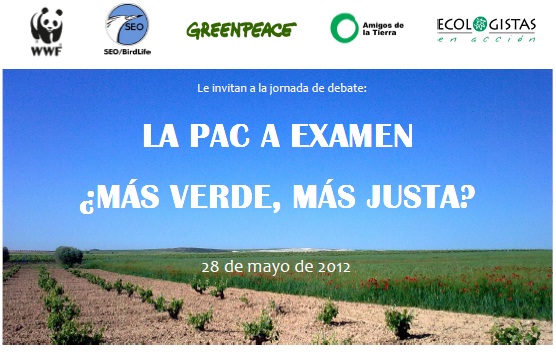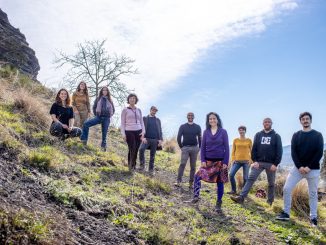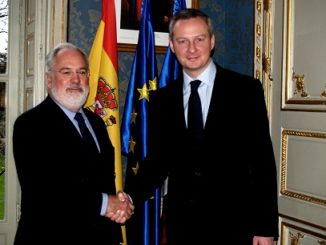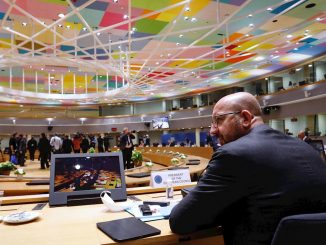During a recent trip to Madrid, I attended a CAP debate organised by Spanish environmental NGOs. I was impressed by the presence of many relevant stakeholders, all expressing different opinions. Following the absence of a real CAP debate in Spain, the event was organised so that NGOs could call for a greener CAP, a demand that was in direct contrast with the position expressed at the event by the representative from the Ministry of Agriculture and Environment, Alicia Villauriz.

Mrs Villauriz stated that the proposals for “greening” direct payments could be counterproductive and not applicable to the reality of Spanish agriculture. When I asked her where I could find the offical position of the Spanish government, to my suprise she told me that the position was not currently available to the public. However since then, Celsa Peiteado from WWF Spain and Ana Caricondo from SEO/Birdlife Spain have both been working tirelessly on CAP issues, and have found the official position of the Spanish government (made public on 15th June).
An Analysis
Reacting to the publication, the two organisations have said that: “(they) believe the position of the Spanish government on CAP – which is fairly aligned with the views defended by the Spanish MEPs in the EU – ignores the environmental problems in agriculture and the need to support those farmers who manage the most valuable farms from an environmental and social perspective.

The Ministry for Agriculture, Food and Environment is proposing a CAP which is more conservative, tailored to the exporting agrofood-industry model. This is a model that won’t be able to solve the crisis in rural areas, in fact it is part of the problem. It could even put long-term food security at risk. Spain is wasting the potential of a greener and territorial CAP that would maintain and create jobs in rural areas, based on the production of quality products and products of origin; preserving the biodiversity and the natural resources on which the farming activities rely.”
From an environmental point of view, several aspects of the Spanish position are particularly questionable:
Greening – The largest concern is the proposal to reduce the budget for the greening component, from 30 to 15% of the direct payments. The government seems to forget that the greening has been key in maintaining the overall CAP budget during the negotiating process.
SEO/BirdLife and WWF Spain recognise the need to adapt certain practices included in the “greening” package to the reality of Mediterranean agriculture, but the Ministry claims certain crops are “green by definition”, like the permanent or water crops, and therefore eligible for the greening payments without any additional specific environmental commitment. This proposal ignores some environmental problems linked to these crops in certain areas, e.g. permanent olive groves and soil erosion. The Ministry proposals could be considered as a mere Pillar 1 green washing, simply maintaining the status quo without real environmental improvements.
Pillar 1 – The proposal to allocate more funds to direct aid (within pillar 1) at the expense of rural development funds by proposing to increase up to 10% the so called “reverse modulation” (option that permits transfer funds from Pillar 2 to 1) is also controversial.
In addition, the government is proposing to limit the redistribution of the basic direct payments persisting in maintaining as much as possible of the current distribution according to the historical model, despite the unfair unbalances between beneficiaries, regions and crops.
Pillar 2 – Spain is claiming a bigger share of the budget from ERDAF according to its Natura 2000 area and agricultural area under HNV (High Nature Value) farming systems (as the country with the biggest surfaces in both issues). However, the Ministry rejects the proposal that the allocation of 25% of the budget for environmental measures should become compulsory, showing a clear incoherence.
Furthermore, Spain intends to use the main part of the already scarce rural development funds to continue funding modernisation of irrigation projects, and even expanding irrigation to new surfaces, without clear water saving targets, underestimating the current problems of water supply for many existing irrigated areas. This is especially worrying due to the lack of information about the advantage of these projects.
The debate is still open
SEO/BirdLife and WWF Spain will continue to call for a different CAP in which economic, environmental and social aspects are considered equally. However, defending these demands – which they believe that would benefit the majority of farmers and the Spanish society as a whole – is not an easy task, given the lack of a long-term vision among policymakers and the current lack of a meaningful public debate. It seems that the fate of over 7,000 million euro a year that this policy means for Spain could be decided without taking the opinion of some stakeholders into consideration. Environmental concerns must be let back into the debate. WWF Spain and SEO/Birdlife are both involved in this year’s Good Food March to Brussels. The biggest civil society action ever planned on the reform of the CAP…






